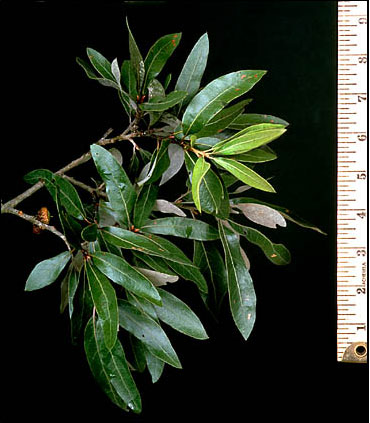Bluejack Oak
Quercus incana
Family: Fagaceae
Natural History

Leaves and branch of bluejack oak | Photo credit: Larry Korhnak, University of Florida
As the common name implies, the primary distinguishing feature of bluejack oak is the blue hue of the leaves. It also has a single bristle on the tip of the leaf. This is a characteristic that separates "red" oaks (with bristle tips) from "white" oaks. It ranges from southeastern Virginia to central Florida and as far west as southeastern Oklahoma and central Texas. Neighboring trees in its pine sandhill and hardwood hammock habitats include longleaf pine, turkey oak, southern red oak, and common persimmon.
The acorns are extremely valuable to wildlife such as deer, raccoons, squirrels, and quail. Sherman's fox squirrel prefers to consume bluejack oak acorns to other acorns, suggesting the acorns of this species taste better. Because this tree is often small and becomes a dense thicket, it provides important shelter and nesting sites for wildlife.
Bluejack oak is rarely used for timber, but it is an excellent wood for fuel, fence posts, and barbecue. It has also been used as pulpwood for making paper.
